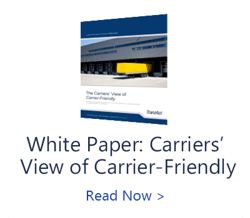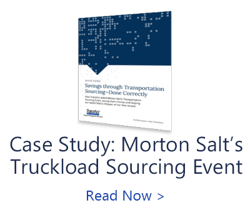Summary of the Language Changes you could see on a Bill of Lading
The National Industrial Transportation League (NITL) wrote the following warning about the changes to the Bill of Lading to their members:
On July 14, 2016, the National Motor Freight Traffic Association (NMFTA), who publishes the National Motor Freight Classification (NMFC), issued Supplement 2 to NMF 100-AP, effective August 13, 2016. The Supplement contains changes to the bill of lading forms:
- the Uniform Straight Bill of Lading, including the Terms and Conditions on the reverse side;
- the Straight Bill of Lading – Short Form; and
- the NMFC rules in Item 360 – Bills of Lading, Freight Bills and Statements of Charges.
The current version of the Uniform Straight Bill of Lading, and its Terms and Conditions have been mostly unchanged for the last 19 years. The changes to the bill of lading were made without notice to the public, nor were shippers given any opportunity to comment, or object to the changes.
The Transportation & Logistics Council (TLC) and the National Shippers Strategic Transportation Council (NASSTRAC), have filed petitions and comments asking the Surface Transportation Board (STB) to suspend and investigate the proposed changes.
The Uniform Straight Bill of Lading and the Straight Bill of Lading - Short Form are widely used by shippers, freight forwarders, brokers and 3PL's that tender freight to motor carriers. Unless other arrangements are made between the parties, such as a formal transportation contract, carriers that are participants in the NMFC are required to use these bills of lading, which incorporate the provisions of the Classification, as well as the carrier's rate and rules tariffs by reference, and are generally binding on the parties.
As outlined in the Petition, below are the most serious changes:
Responsible Party:
Section 1. (a) of the "old" bill of lading provided as follows:
Sec. 1. (a) The carrier or the party in possession of any of the property described in this bill of lading shall be liable as at common law for any loss thereof or damage thereto, except as hereinafter provided. Section 1. (a) of the "new" bill of lading provides as follows: Sec. 1. (a) The carrier shown as transporting the property described in this bill of lading shall be liable as at common law for any loss or damage to the shipment, except as provided herein.
Section 1. (a) of the "new" bill of lading provides as follows:
Sec. 1. (a) The carrier shown as transporting the property described in this bill of
lading shall be liable as at common law for any loss or damage to the shipment, except as
provided herein.
Burden of Proof:
Section 1. (b) of the "old" bill of lading provided:
(b) No carrier shall be liable for any loss or damage to a shipment or for any delay caused
by an Act of God, the public enemy, the authority of law, or the act or default of shipper.
Except in the case of negligence of the carrier or party in possession, the carrier or party
in possession shall not be liable for loss, damage or delay which results: when the
property is stopped and held in transit upon request of the shipper, owner or party entitled
to make such request; or from faulty or impassible highway, or by lack of capacity of a
highway bridge or ferry; or from a defect or vice in the property; or from riots or strikes.
The burden to prove freedom from negligence is on the carrier or the party in possession.
Section 1. (b) of the "new" bill of lading contains the most egregious of the changes, which
change the legal burdens of proof:
(b) No carrier shall be liable for any loss or damage or for any delay caused by an Act of
God, the public enemy, the authority of law, the act or default of the shipper,
riots or strikes, or any related causes. Except in the case of negligence of the carrier, the carrier shall not be liable for loss, damage or delay which results: when the property is stopped and held in transit upon request of the shipper, owner or party entitled to make such request; or from faulty or impassible highway, or by lack of capacity of a highway, bridge or ferry; or from a defect or vice in the property. The burden to prove carrier negligence is on the shipper.
Comment: There are two significant changes in the new language. First, it adds "riots or strikes or any related causes" to the list of the common law defenses to carrier liability. But, more importantly it shifts the carrier's burden for proving freedom from negligence, to the shipper who now must prove that the carrier was negligent.
These changes are contrary to over a century of law involving the interpretation and application of the "Carmack Amendment", now codified at 49 USC 14706. As the Supreme Court stated in Missouri Pacific R.R. Co. v. Elmore & Stahl, 337 U.S. 134 (1964).
The reasoning for not requiring the shipper to prove negligence is obvious. When the shipper tenders his goods to the carrier he doesn't "ride shotgun" with them. He has no way to know what the carrier does with the goods, so it would be virtually impossible for the shipper to prove that the cause of the loss or damage was the carrier's "negligence", for example, which party may have caused an accident or whether the carrier failed to adequately protect the goods from theft by a third party.
Moreover, the addition of a negligence standard runs counter to the strict liability standard implemented by the Carmack Amendment (i.e., good condition at origin, damaged condition at destination and the amount of damages). Indeed, one of the core principles behind the enactment of the Carmack Amendment was to do away with forcing shippers to prove a carrier was negligent for the reasons stated above. As such, this new provision is unconscionable and clearly contrary to the Carmack Amendment.
Reasonable Dispatch Standard:
Section 1. (b) of the "old" bill of lading provided:
Sec. 2. Unless arranged or agreed upon, in writing, prior to shipment, carrier is not bound to transport a shipment by a particular schedule or in time for a particular market, but is responsible to transport with reasonable dispatch. In case of physical necessity, carrier may forward a shipment via another carrier.
Section 2. of the "new" bill of lading provides:
Sec. 2. Unless arranged or agreed to in writing or electronically, prior to shipment, carrier is not bound to deliver a shipment by a particular schedule or in time for a particular market, but will transport the shipment in the regular course of its providing transportation services. In the case of physical necessity while in transit, carrier may forward the shipment via another carrier.
Comment: Here the NMFTA has changed the established standard, recognized and applied by the courts for a century, which define the carrier's duty to deliver with "reasonable dispatch.” As the Supreme Court stated in New York, P. & N.R. Co. v. Peninsula Produce Exch. Of Maryland 240 U.S. 34 (1916):
...It is said that there is a different responsibility on the part of the carrier with respect to delay from that which exists where there is a failure to carry safely. But the difference is with respect to the measure of the carrier's obligation; the duty to transport with reasonable dispatch (sic) is none the less an integral part of the normal undertaking of the carrier."
Timeframe for Filing Claims:
Section 3. (b) of the "old" bill of lading provided as follows:
(b) Claims for loss or damage must be filed within nine months after the delivery of the property (or, in the case of export traffic, within nine months after delivery at the port of export), except that claims for failure to make delivery must be filed within nine months after a reasonable time for delivery has elapsed.
Section 3. (b) of the "new" bill of lading provides:
(b) Claims for damage must be filed with the carrier not more than nine (9) months from the date of delivery (or in the case of export traffic, not more than nine (9) months after delivery at the port of export, or in the case of import traffic, not more than nine (9) months after pickup at the place of tender). Claims for loss must be filed with the carrier not more than nine (9) months from the date of the bill of lading.
Comment: This change shortens the time for filing a claim for a "loss", which could be a "shortage" or a "non-delivery", because it runs from the “date of the bill of lading” rather than the date of delivery. The change also raises additional questions such as what is the “date of the bill of lading”? Is it the date the shipment was picked up? Or is it the date the bill of lading was generated? This change is unreasonable since a shortage or non-delivery would not normally be identified until "a reasonable time for delivery has elapsed.”
The following article also outlines several of the Bill of Lading changes:
Now You See Them, Now You Don’t: Longstanding Terms of the NMFC’s Uniform Bill of Lading Vanish
MORE RESOURCES YOU MAY BE INTERESTED IN:




